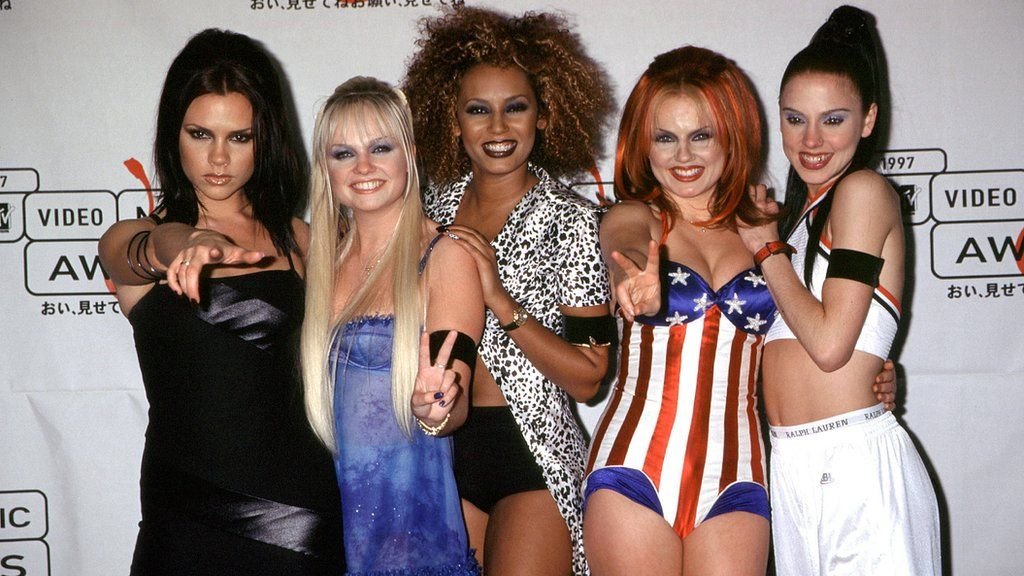The ‘Ladettes’ of the Millennium Turn: The 21st century woman
By Madeline Richards, 1st year History
BBC ‘How the Spice Girls Changed the World’ (2019)
The concept of ‘Ladette culture’ emerged on the centre stage of 1990s British society, as more and more women found liberation in behaving the same as men; boisterous, outspoken and unapologetic. Women were suddenly claiming the right to stand shoulder to shoulder with the men, out drinking, out partying and generally being as badly behaved as the ‘lads’. This new facet of feminism was suddenly defining the concept of girl power. Famous faces of the movement included British icons such as Zoe Ball, Sarah Cox and Denise Van Outen, all playing to a more masculine script and ultimately reshaping the idea of what it meant to be a woman. This new realm of womanhood was further defined by the Spice Girls, who played into this lively, unruly and outgoing figure of 1990s British pop-culture.
This new face of femininity sought to encroach upon traditionally male dominated spheres and deconstruct the traditional and conservative gender model that boasted softness and politeness in what was defined as the antithesis of masculinity. To the shock and horror of the media and many men, women began to step foot into spaces that were historically regarded as the sole preserve of men, such as pubs, as this growth of ‘ladette culture’ challenged the boundaries of the traditional feminine domestic sphere.
Professor Angela Smith of Sunderland University asserts that “The Ladette culture liberated young women from the confines of a very conservative form of femininity because they could behave like men”.
Undoubtedly, it was not a smooth ride. Many press outlets bashing girls’ promiscuity and unruliness, with exaggerated news stories being utilised to titillate the public with the ‘girls gone wild’ trope, perpetuated by men feeling threatened by the women who suddenly stood next to them at the same bars, ordering the same drinks and often being able to stay out partying later and drinking more. As a result, the media increasingly photographed and framed these women as party-obsessed, overly-promiscuous and irresponsible binge-drinkers, despite only mimicking men’s behaviour.
Criticism of this behaviour was rife, particularly from the Daily Mail who were constantly printing headlines of girls in the gutter. Although not all press was negative, it mostly leaned towards questioning whether this was feminism gone too far ad many felt that this was in fact the ugly underbelly of equality. The core foundations of ladette culture completely opposed the conservative expectation of how women were supposed to traditionally act, quiet, meek and stood a step behind the men, firmly out of the limelight. However, it seemed time was swiftly moving forward as women were asking themselves; why is it ok for men to do this but not us? These girls were taboo breakers in a world with the expectation for women to stay at home and have children.
With women in the nineties and noughties having more and more opportunity for career progression, making more money than ever before and having children later in their lives, ladettism prospered and enhanced gender liberation for so many, and for the first time, women were able to behave just like men. This rhetoric was further enhanced by the cultural phenomenon of the Spice Girls who sent ripples across the pop-culture world of Britain embodying a new type of feminism and becoming true figures in the girl power movement. They set the tone for bolshy women who would stomp their way to world domination and success completely aligned with the ascent of the ‘ladette’.
A core part of the Spice Girls’ brand was their individual identities. Nicknamed Posh, Baby, Scary, Sporty and Baby Spice, the band embodied a wider spectrum of femininity and represented different archetypes of who and what a girl could be. However, journalist Miranda Sawyer argues that this peddled “diluted feminism”, perpetuating the band’s criticism that dubbed their feminism as hollow. Although to some extent their concept of ‘Girl Power’ was a marketing scheme, it is undeniably a movement that millions of girls resonated with, a transformative perspective of feminism that was accessible therefore making this something that would be an enduring part of female liberation.
Mel C stated that “Girl power is being able to do things just as well as – or even better than the boys and be what we want to be”. This message is heavily reflected in the concept of ‘ladette’ culture ,driving the possibility for girls have every opportunity that boys were offered, in a firm step towards harder line feminism.

